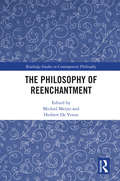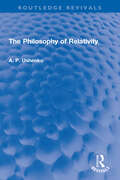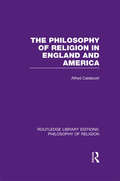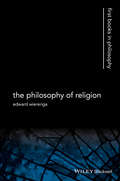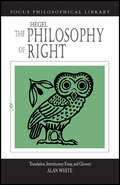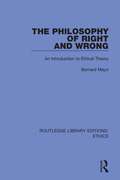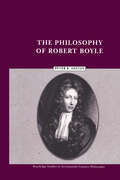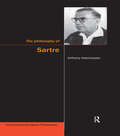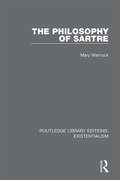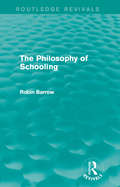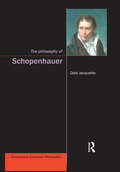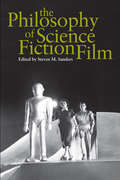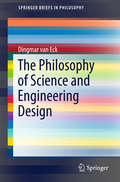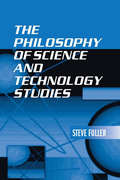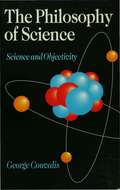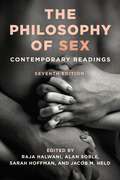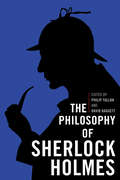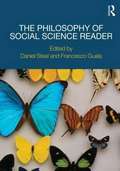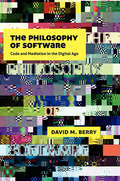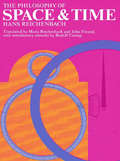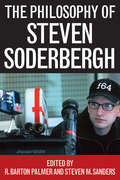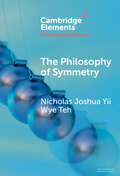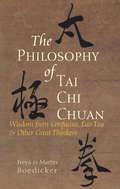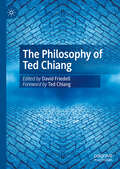- Table View
- List View
The Philosophy of Reenchantment (Routledge Studies in Contemporary Philosophy)
by Michiel Meijer Herbert De VrieseThis book presents a philosophical study of the idea of reenchantment and its merits in the interrelated fields of philosophical anthropology, ethics, and ontology. It features chapters from leading contributors to the debate about reenchantment, including Charles Taylor, John Cottingham, Akeel Bilgrami, and Jane Bennett. The chapters examine neglected and contested notions such as enchantment, transcendence, interpretation, attention, resonance, and the sacred or reverence-worthy—notions that are crucial to human self-understanding but have no place in a scientific worldview. They also explore the significance of adopting a reenchanting perspective for debates on major concepts such as nature, naturalism, God, ontology, and disenchantment. Taken together, they demonstrate that there is much to be gained from working with a more substantial and affirmative concept of reenchantment, understood as a fundamental existential orientation towards what is seen as meaningful and of value. The Philosophy of Reenchantment will be of interest to scholars and advanced students in philosophy—especially those working in moral philosophy, metaphysics, philosophy of religion, theology, religious studies, and sociology.
The Philosophy of Relativity (Routledge Revivals)
by A. P. UshenkoFirst published in 1937, The Philosophy of Relativity contains an exposition of Einstein, a step-by step deduction of the main equations of both the special and general theories of relativity. This book sets out to expound an original theory of events, change and space-time, and to offer a new explanation of perception. But in order to ramify his belief in the objective reality of space and time, the author digresses into problems of general interest such as cognitive significance of art and Zeno’s paradoxes. He also defends his theory in an appraisal of the fashionable views of logical positivism and pragmatism. This book is a must read for scholars and researchers of philosophy of science and philosophy in general.
The Philosophy of Religion in England and America (Routledge Library Editions: Philosophy of Religion)
by Alfred CaldecottA classic in the area, originally published in 1901, this book is a survey of the past work in the field of philosophy of religion, a conspectus of literature and comparison of methods and theologies from the Reformation to the start of the twentieth century. The Introduction part of the volume offers a classification system to explain the order of the detailed section of the book. Lesser-known theologians are covered as well as great thinkers, a deliberate choice on the part of the author. Within each chapter, types of theism are then broken down into sections on individual thinkers, or group of thinkers with a reference to their main works.
The Philosophy of Religion: An Inquiry Into Divine Attributes (First Books in Philosophy)
by Edward R. WierengaPhilosophy of Religion is an engaging introduction to the main tenets of this fascinating subject, written clearly and with detailed enough explanation to be accessible to those new to the field, whilst providing original and challenging ideas to more experienced students. The ideal introduction to this fascinating subject, providing a clear and engaging entry point to the field The book lucidly introduces the main issues in philosophy of religion and develops a rigorous yet accessible approach to evaluating positions on these issues No previous exposure to philosophy is assumed, and more technical topics are introduced and explained before they are employed Original ideas and new approaches to concepts within the book ensure that it is also relevant to those already familiar with the subject
The Philosophy of Right
by Alan White Georg Wilhelm Friedrich HegelA modern, highly readable translation of a primary text in Western philosophy. Complete translation in English with introduction, notes and glossary. The glossary is keyed to the primary occurrences of important terms in the text and provides insights into the concepts beyond the translation, especially useful pedagogical device for students coming to Hegel for the first time. Focus Philosophical Library translations are close to and are non-interpretative of the original text, with the notes and a glossary intending to provide the reader with some sense of the terms and the concepts as they were understood by Hegel's immediate audience.
The Philosophy of Right and Wrong
by Bernard MayoTrying to understand morality involves grappling with seemingly irreconcilable conflicts between opposing theoretical positions. Originally published in 1986, this book offers a solution in terms of natural law, which involves reflections on the relevant aspects of human nature and the human condition, as well as on the special nature of prescriptive language. It also discusses several major movements in moral philosophy, both classical and contemporary and examines them in the light of a set of tests for an adequate moral theory.
The Philosophy of Robert Boyle (Routledge Studies in Seventeenth-Century Philosophy #Vol. 5)
by Peter R. AnsteyFirst Published in 2004. Routledge is an imprint of Taylor & Francis, an informa company.
The Philosophy of Sartre (Continental European Philosophy Ser. #13)
by Anthony HatzimoysisPlaywright, novelist, political theorist, literary critic and philosopher, Jean-Paul Sartre (1905-80) remains an iconic figure. This book examines his philosophical ideas and methods. It is an introductory guide for the student who wishes to understand Sartre's philosophical argumentation. It reconstructs in plain language key instances of Sartre's philosophical reasoning at work and shows how certain questions arise for Sartre and what philosophical tools he uses to address those questions. Each chapter considers a range of issues in the Sartrean corpus including his conception of phenomenology, the question of self-identity, the Sartrean view of conscious beings, his understanding of the self, his theory of value, human action as both the originator and the outcome of social processes, dialectical reason, and his conception of artistic activity. Hatzimoysis uncovers the philosophical argumentation, identifies Sartre's most important philosophical ideas and addresses the arguments in which those ideas are employed. Readers are able to get a real understanding of Sartre's approach to the activity of philosophising and how his method favours certain types of philosophical analysis.
The Philosophy of Sartre (Routledge Library Editions: Existentialism #7)
by Mary WarnockThis book, first published in 1965, is a critical exposition of the philosophical doctrines of Jean-Paul Sartre. His contribution to ethical and political theory, and to metaphysics and ontology, is reviewed against the background of German idealism and phenomenology, and his arguments are presented clearly so that readers may assess their philosophical value in their own right.
The Philosophy of Schooling (Routledge Revivals)
by Robin BarrowThis book, first published in 1981, provides a penetrating and lucid introduction to the philosophy of education. The emphasis on schooling rather than education draws attention to the broad spectrum of the book: recognising that schools generally do more than educate, Dr. Barrow specifically addresses himself to the larger question of what schools are for and what they should do. This book will be of interest both to students of philosophy and students of education.
The Philosophy of Schopenhauer (Continental European Philosophy Ser. #6)
by Dale JacquetteDale Jacquette charts the development of Schopenhauer's ideas from the time of his early dissertation on The Fourfold Root of the Principle of Sufficient Reason through the two editions of his magnum opus The World as Will and Representation to his later collections of philosophical aphorisms and competition essays. Jacquette explores the central topics in Schopenhauer's philosophy including his metaphysics of the world as representation and Will, his so-called pessimistic philosophical appraisal of the human condition, his examination of the concept of death, his dualistic analysis of free will, and his simplified non-Kantian theory of morality. Jacquette shows how these many complex themes fit together in a unified portrait of Schopenhauer's philosophy. The synthesis of Plato, Kant and Buddhist and Hindu ideas is given particular attention as is his influence on Nietzsche, first a follower and then arch opponent of Schopenhauer's thought, and the early Wittgenstein. The book provides a comprehensive and in-depth historical and philosophical introduction to Schopenhauer's distinctive contribution to philosophy.
The Philosophy of Science Fiction Film (The\philosophy Of Popular Culture Ser.)
by Steven M. SandersThought-provoking essays on movies from Metropolis to The Matrix. The science fiction genre, through films such as Blade Runner, Invasion of the Body Snatchers, and The Terminator, not only entertains us but makes us think—about the implications of new technologies, the parameters and possibilities of space and time, and, in the age of artificial intelligence and robotics, the meaning of humanity itself. The Philosophy of Science Fiction Film explores the storylines, conflicts, and themes of fifteen science fiction film classics. Editor Steven M. Sanders and a group of outstanding scholars in philosophy, film studies, and other fields raise science fiction film criticism to a new level by penetrating the surfaces of the films to expose the underlying philosophical arguments, ethical perspectives, and metaphysical views.
The Philosophy of Science and Engineering Design
by Dingmar Van EckThis book discusses the relationship between the philosophy of science and philosophy of engineering, and demonstrates how philosophers of engineering design as well as design researchers can benefit from the conceptual toolkit that the philosophy of science has to offer. In this regard, it employs conceptual tools from the philosophical literature on scientific explanation to address key issues in engineering design and philosophy of engineering design. Specifically, the book focuses on assessing the explanatory value of function ascriptions used in engineering design and philosophy of technical functions; on elaborating the structure of explanation in engineering design; on assessing the role and value of design representations in engineering design and philosophy thereof; and on elaborating means for the testing of design methods. Presenting a novel and effective approach to tackling key issues in the field, philosophers of engineering and design alike will greatly benefit from this book.
The Philosophy of Science and Technology Studies: A New Beginning For Science And Technology Studies
by Steve FullerAs the field of Science and Technology Studies (STS) has become more established, it has increasingly hidden its philosophical roots. While the trend is typical of disciplines striving for maturity, Steve Fuller, a leading figure in the field, argues that STS has much to lose if it abandons philosophy. In his characteristically provocative style, he offers the first sustained treatment of the philosophical foundations of STS and suggests fruitful avenues for further research. With stimulating discussions of the Science Wars, the Intelligent Design Theory controversy, and theorists such as Donna Haraway and Bruno Latour, Philosophy of Science and Technology Studies is required reading for students and scholars in STS and the philosophy of science.
The Philosophy of Science: Science and Objectivity
by S George CouvalisThis comprehensive textbook provides a clear nontechnical introduction to the philosophy of science. Through asking whether science can provide us with objective knowledge of the world, the book provides a thorough and accessible guide to the key thinkers and debates that define the field. George Couvalis surveys traditional themes around theory and observation, induction, probability, falsification and rationality as well as more recent challenges to objectivity including relativistic, feminist and sociological readings. This provides a helpful framework in which to locate the key intellectual contributions to these debates, ranging from those of Mill and Hume, through Popper and Kuhn to Laudan, Bloor and Garfinkel among others.
The Philosophy of Sex: Contemporary Readings
by Alan Soble Raja Halwani Sarah Hoffman Jacob HeldThe seventh edition of The Philosophy of Sex has quite a few changes. First, it has nine new essays specifically written for this volume: Talia Mae Bettcher's "Trans 101" and Burkay Ozturk's "The Negotiative Theory of Gender Identity and the Limits of First-Person Authority" deal with transgender issues, the former going over some basics and the latter questioning the view that a person has a non-defeasible epistemic and ethical decision regarding what their gender is. The seventh edition has three essays that are new to the volume, though they have been published elsewhere before and also has three revised essays from the sixth one.
The Philosophy of Sherlock Holmes (The Philosophy of Popular Culture)
by Philip Tallon and David BaggettEssays about the famed fictional detective and the mysteries of life: &“Both elegantly erudite and consistently entertaining&” (E. J. Wagner, Edgar Award–winning author of The Science of Sherlock Holmes). Sir Arthur Conan Doyle&’s detective has stood as a unique figure for more than a century with his reliance on logical rigor, his analytic precision, and his disregard of social mores. A true classic, the Sherlock Holmes character continues to entertain twenty-first-century audiences on the page, stage, and screen. In The Philosophy of Sherlock Holmes, a team of leading scholars uses the beloved character as a window into the quandaries of existence, from questions of reality to the search for knowledge. The essays explore the sleuth&’s role in revealing some of the world's most fundamental philosophical issues, discussing subjects such as the nature of deception, the lessons enemies can teach us, Holmes&’s own potential for criminality, and the detective&’s unique but effective style of inductive reasoning. Emphasizing the philosophical debates raised by generations of devoted fans, this intriguing volume will be of interest to philosophers and Holmes enthusiasts alike.
The Philosophy of Social Science Reader
by Francesco Guala Daniel SteelThe Philosophy of Social Science Reader is an outstanding, comprehensive and up-to-date collection of key readings in the philosophy of social science, covering the essential issues, problems and debates in this important interdisciplinary area. Each section is carefully introduced by the editors, and the readings placed in context. The anthology is organized into seven clear parts: Values and Social Science Causal Inference and Explanation Interpretation Rationality and Choice Individualism Norms Cultural Evolution. Featuring the work of influential philosophers and social scientists such as Ernest Nagel, Ian Hacking, John Searle, Clifford Geertz, Daniel Kahneman, Steven Lukes and Richard Dawkins, The Philosophy of Social Science Reader is the ideal text for philosophy of social science courses, and for students in related disciplines interested in the differences between the social and natural sciences.
The Philosophy of Social Science: An introduction
by Martin HollisThis textbook by Martin Hollis offers an exceptionally clear and concise introduction to the philosophy of social science. It examines questions which give rise to fundamental philosophical issues. Are social structures better conceived of as systems of laws and forces, or as webs of meanings and practices? Is social action better viewed as rational behaviour, or as self-expression? By exploring such questions, the reader is led to reflect upon the nature of scientific method in social science. Is the aim to explain the social world after a manner worked out for the natural world, or to understand the social world from within?
The Philosophy of Software: Code and Mediation in the Digital Age
by D. BerryThis book is a critical introduction to code and software that develops an understanding of its social and philosophical implications in the digital age. Written specifically for people interested in the subject from a non-technical background, the book provides a lively and interesting analysis of these new media forms.
The Philosophy of Space and Time
by Hans ReichenbachAn important landmark in the development of the empiricist conception of geometry, this book is still one of the clearest and most valuable expositions of the crisis in physical science and mathematics occasioned by the advent of the non-Euclidean geometries. With unusual depth and clarity, it covers the problem of the foundations of geometry, the theory of time, the theory and consequences of Einstein's relativity including: relations between theory and observations, coordinate definitions, relations between topological and metrical properties of space, the psychological problem of the possibility of a visual intuition of non-Euclidean structures, and many other important topics in modern science and philosophy.While some of the book utilizes mathematics of a somewhat advanced nature, the exposition is so careful and complete that most people familiar with the philosophy of science or some intermediate mathematics will understand the majority of the ideas and problems discussed.Partial CONTENTS: I. The Problem of Physical Geometry. Universal and Differential Forces. Visualization of Geometries. Spaces with non-Euclidean Topological Properties. Geometry as a Theory of Relations. II. The Difference between Space and Time. Simultaneity. Time Order. Unreal Sequences. Ill. The Problem of a Combined Theory of Space and Time. Construction of the Space-Time Metric. Lorentz and Einstein Contractions. Addition Theorem of Velocities. Principle of Equivalence. Einstein's Concept of the Problems of Rotation and Gravitation. Gravitation and Geometry. Riemannian Spaces. The Singular Nature of Time. Spatial Dimensions. Reality of Space and Time.
The Philosophy of Steven Soderbergh (The Philosophy of Popular Culture #Ppcs)
by R. Barton Palmer and Steven M. Sanders&“Provocative, insightful, and instructive analysis of the cinematic and philosophical significance of Steven Soderbergh&’s work.&” —Jason Holt, editor of The Daily Show and Philosophy: Moments of Zen in the Art of Fake News Widely regarded as a turning point in American independent cinema, Steven Soderbergh's sex, lies, and videotape launched the career of its twenty-six-year-old director, whose debut film was nominated for an Academy Award and went on to win the Cannes Film Festival&’s top award, the Palme d&’Or. The Philosophy of Steven Soderbergh breaks new ground by investigating salient philosophical themes through the unique story lines and innovative approaches to filmmaking that distinguish this celebrated artist. Editors R. Barton Palmer and Steven M. Sanders have brought together leading scholars in philosophy and film studies for the first systematic analysis of Soderbergh&’s entire body of work, offering the first in-depth exploration of the philosophical ideas that form the basis of the work of one of the most commercially successful and consistently inventive filmmakers of our time.
The Philosophy of Symmetry (Elements in the Philosophy of Physics)
by Nicholas Joshua Yii Wye TehThis Element is a concise, high-level introduction to the philosophy of physical symmetry. It begins with the notion of 'physical representation' (the kind of empirical representation of nature that we effect in doing physics), and then lays out the historically and conceptually central case of physical symmetry that frequently falls under the rubric of 'the Relativity Principle,' or 'Galileo's Ship.' This material is then used as a point of departure to explore the key hermeneutic challenge concerning physical symmetry in the past century, namely understanding the physical significance of the notion of 'local' gauge symmetry. The approach taken stresses both the continuity with historically important themes such as the Relativity Principle, as well as novel insights earned by working with contemporary representational media such as the covariant phase space formalism.
The Philosophy of Tai Chi Chuan
by Freya Boedicker Martin BoedickerThe essence of Tai Chi Chuan lies in the rich philosophy of ancient China. While most Tai Chi practitioners are aware of the value that studying Chinese philosophy can bring to their practice, it is often difficult to pick out those texts that are most relevant to Tai Chi and connected to its development. The Philosophy of Tai Chi Chuan presents, for the first time, a concise overview of the Chinese martial and spiritual philosophies that drive this ancient tradition.Authors Freya and Martin Boedicker, who teach Tai Chi throughout Europe and South Africa, present freshly translated excerpts from such popular and widely studied works as the Tao Te Ching, the I Ching, and The Art of War, as well as writings by philosophers and strategists such as Zhuangzi and Wuzi. Each chapter of this concise volume focuses on a single work or philosopher, and includes a short history of each one as well as a description of their relevance to Tai Chi. An extensive glossary of important Chinese terms rounds out the book. The Philosophy of Tai Chi Chuan offers readers a direct connection with the concepts that form the foundation of Tai Chi, inspiring a deeper understanding of the art and its applications.From the Hardcover edition.
The Philosophy of Ted Chiang
by David FriedellTed Chiang is one of the most insightful science fiction writers of our time. His writing has garnered high praise, including four Nebula awards, four Hugo awards and the John W. Campbell Award for Best New Writer. His short story, “Story of Your Life,” was the basis of the 2016 film Arrival. This volume, which includes a foreword by Chiang and twenty-one short essays by philosophers, analyzes the philosophical significance of Chiang’s popular science fiction. These essays discuss how Chiang’s stories engage with age-old and contemporary philosophical questions pertaining to free will, God, technology, existentialism, beauty, procreation, contradictions, time, human intelligence, alien intelligence, and artificial intelligence. This volume probes terrain that should be of interest to experts in philosophy, while still being accessible to a general audience interested in science fiction. These essays, like Ted Chiang’s writing, demonstrate how excellent science fiction can help us to think about the world and our place in it.
